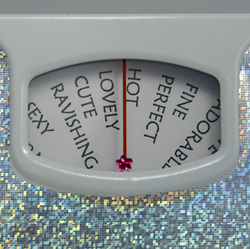 The Moss Maiden, www.heligan.com
The Moss Maiden, www.heligan.com By Dr. Deanna McCrary, ND
You may be familiar with the word terrain from geography where it describes the physical features of a piece of land. The terrain tells us whether or not crops will grow successfully there. It tells us if the landscape is rocky, cavernous or if there is access to a lot -- or very little -- sunshine, water and minerals. All of these things determine the types of plants or animals that will flourish on the land. Layers of rock may reveal the history of the land -- fossils, floods or the type of vegetation that has grown there in the past. When the land is healthy and fertile, when the soil has just the right mixture of minerals and nutrients it can be a source of sustenance, allowing many life forms to thrive. What does this have to do with our bodies? A lot!
Just like the land, our bodies have a terrain – the sum of our genetic history, our personal history and choices, and our exposure to toxins. Our terrain reflects not only our inheritances but also how much access our bodies have had to sunshine, water, vitamins, protein, fats and minerals as well as pollutants, chemicals and pharmaceutical drugs. Just as toxic waste dumps are often devoid of vegetation, a body's terrain will be affected by accumulations of toxins -- whether ingested, breathed in or absorbed through the skin. All of these things affect how readily our bodies will resist infections, allow beneficial or harmful bacteria to flourish, prevent or allow cancer cells to grow and increase or decrease our susceptibility to any disease state.
The concept of bodily terrain is often talked about in modern-day naturopathic medicine, however the idea has been around since the 1800s and was popular among French homeopathic doctors of the day. The "germ theory" of health was developed in this era by Louis Pasteur (who developed pasteurization) which claims that external microbes invade the body and cause illness and that health can be regained when the germs are killed off. Conventional medicine today ascribes to this idea and uses drugs such as antibiotics, to counteract the "offending" microbe. A contemporary of Pasteur, Antoine Bechamp, a medical doctor put forth the idea that whether or not a disease state occurred was greatly influenced by the environment that the organism found itself in. We are walking vessels of bacteria -- throughout our lives, all of us have germs such as staph or strep bacteria colonizing in us at one time or another. We carry up to five pounds of bacteria in our gut alone! And yet these microbes only become problems when they are hosted in a body that supports their overgrowth or invasion into tissues where they don't normally reside. Our bodies have their own ecosystems and will or will not support pathological organisms based on our nutritional status , genetic susceptibility and levels of toxicity.
Be a caring, passionate gardener of your inner terrain. Sunshine, fresh air, sleep and rest, nutrient-dense foods, pure water, laughter, surrounding yourself as much as possible with positive, affirming people and movement that brings you pleasure will fortify your inner lands and keep your garden free of any nasty bugs.
Just as we look to maps or guides to help us navigate difficult or unknown terrain, naturopathic medical doctors can help you discover and cultivate your own inner landscape.
© Deanna McCrary, ND and LifeJOY Natural Medicine, 2013. Unauthorized use and/or duplication of this material without express and written permission from this blog’s author and/or owner is strictly prohibited. Excerpts and links may be used, provided that full and clear credit is given to Dr. Deanna McCrary, ND and LifeJOY Natural Medicine with appropriate and specific direction to the original content.
You may be familiar with the word terrain from geography where it describes the physical features of a piece of land. The terrain tells us whether or not crops will grow successfully there. It tells us if the landscape is rocky, cavernous or if there is access to a lot -- or very little -- sunshine, water and minerals. All of these things determine the types of plants or animals that will flourish on the land. Layers of rock may reveal the history of the land -- fossils, floods or the type of vegetation that has grown there in the past. When the land is healthy and fertile, when the soil has just the right mixture of minerals and nutrients it can be a source of sustenance, allowing many life forms to thrive. What does this have to do with our bodies? A lot!
Just like the land, our bodies have a terrain – the sum of our genetic history, our personal history and choices, and our exposure to toxins. Our terrain reflects not only our inheritances but also how much access our bodies have had to sunshine, water, vitamins, protein, fats and minerals as well as pollutants, chemicals and pharmaceutical drugs. Just as toxic waste dumps are often devoid of vegetation, a body's terrain will be affected by accumulations of toxins -- whether ingested, breathed in or absorbed through the skin. All of these things affect how readily our bodies will resist infections, allow beneficial or harmful bacteria to flourish, prevent or allow cancer cells to grow and increase or decrease our susceptibility to any disease state.
The concept of bodily terrain is often talked about in modern-day naturopathic medicine, however the idea has been around since the 1800s and was popular among French homeopathic doctors of the day. The "germ theory" of health was developed in this era by Louis Pasteur (who developed pasteurization) which claims that external microbes invade the body and cause illness and that health can be regained when the germs are killed off. Conventional medicine today ascribes to this idea and uses drugs such as antibiotics, to counteract the "offending" microbe. A contemporary of Pasteur, Antoine Bechamp, a medical doctor put forth the idea that whether or not a disease state occurred was greatly influenced by the environment that the organism found itself in. We are walking vessels of bacteria -- throughout our lives, all of us have germs such as staph or strep bacteria colonizing in us at one time or another. We carry up to five pounds of bacteria in our gut alone! And yet these microbes only become problems when they are hosted in a body that supports their overgrowth or invasion into tissues where they don't normally reside. Our bodies have their own ecosystems and will or will not support pathological organisms based on our nutritional status , genetic susceptibility and levels of toxicity.
Be a caring, passionate gardener of your inner terrain. Sunshine, fresh air, sleep and rest, nutrient-dense foods, pure water, laughter, surrounding yourself as much as possible with positive, affirming people and movement that brings you pleasure will fortify your inner lands and keep your garden free of any nasty bugs.
Just as we look to maps or guides to help us navigate difficult or unknown terrain, naturopathic medical doctors can help you discover and cultivate your own inner landscape.
© Deanna McCrary, ND and LifeJOY Natural Medicine, 2013. Unauthorized use and/or duplication of this material without express and written permission from this blog’s author and/or owner is strictly prohibited. Excerpts and links may be used, provided that full and clear credit is given to Dr. Deanna McCrary, ND and LifeJOY Natural Medicine with appropriate and specific direction to the original content.


 RSS Feed
RSS Feed